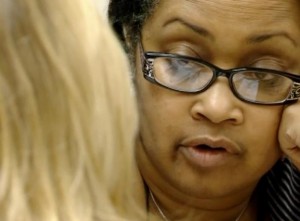Marian Hatcher talks about journey from prostitution to counselor, role in new documentary
Marian Hatcher says if she can become a drug addict and prostitute, anyone can.
Hatcher, 49, had a finance degree from Loyola University, a good job in accounting supervising a staff of 25 at a dialysis company, and was married and the mother of five children.
However, underlying depression and physical and mental abuse from her husband prompted her to turn to crack cocaine for comfort.
She disappeared on the streets of Chicago for two years, supporting her drug habit through prostitution. Some of the men she picked up beat, raped and kidnapped her. Eventually Hatcher ended up in jail.
However, her story has a happy ending. Hatcher turned her life around after being incarcerated and now works for the Cook County Jail in the Sheriff’s Women’s Justice Programs, helping to rescue other women from prostitution and human traffickers. This program will get nationwide attention in a 90-minute Oprah Winfrey Network documentary, Prostitution: Leaving the Life, scheduled to air August 18 at 9 p.m. Eastern.
“Someone helped me. Someone gave me a chance,” Hatcher told SocialWorkersSpeak.org. “(Prostitution) has always been a problem but now it’s getting the press, the notice.”
In the program, peer coordinators such as Hatcher who were former prostitutes provide women with counseling, job and housing support and other services they need to not slip back into prostitution.
Hatcher wears a lot of hats in the program. Although she was a peer coordinator and continues to sometimes do this job she was recently promoted to special projects assistant. Hatcher also takes calls on a human trafficking hotline and provides services to women soon after they are arrested for prostitution.

Women in the Cook County Sheriff's Women's Justice Programs. Image courtesy of Cook County Sheriff's Office.
Hatcher said the prostitution program uses an integrated treatment model and is evidence and researched based. Besides peer coordinators the program also has counselors, mental health professionals and social work interns on staff, she said.
Hatcher will celebrate seven years of sobriety on July 29. She comes from a close knit family and says her relationship with her children is improving. Her work is also fulfilling but can be emotionally draining.
“Some of the women I was on the street with and some women I was incarcerated with are in the program,” she said. “Some come multiple times but we have had to learn how to be strong and be able not be harsh or hard but accept the reality that not everyone gets it at the same time.”
OWN gave the National Association of Social Workers an advance copy of Prostitution: Leaving the Life. Social workers in Washington, D.C. and Illinois are reviewing it and we will post their comments soon.
Social workers also help women overcome challenges that could lead to prostitution, including domestic violence, human trafficking and addictions. To learn more visit the National Association of Social Workers Peace and Social Justice Web pages, which include a section on human trafficking, by clicking here; the NASW “Help Starts Here” Web pages on domestic violence by clicking here; and the “Help Starts Here” Addictions Web page by clicking here.
| Leave A CommentAdvertisement
5 Comments
Leave a Comment
You must be logged in to post a comment.




I’m concerned after reading this article that social workers don’t know the difference between prostitution and drug addiction/mental illness and abuse.
There are many more people who work in the sex industry who are not on drugs than there are who abuse drugs as in Ms. Hatcher’s case.
To continue to conflate drug addition and other social problems with prostitution as well as forced labor in the sex industry reduces your professional credibility to zero.
I implore you to stop defacing our industry.
When your industry disparages our industry by conflating it with drug addition and abuse your industry stakes out its privilege position by making us out to be a pathology and thereby making sure you have a clear path to profit off the criminalization of prostitution and that is unacceptable.
Marian Hatcher is an inspiration to women everywhere. She’s been through it all, and then chose to turn her life around. Her personal story and courageous efforts have helped others to start their lives anew. Bless you, Marian, and thank you.
I am an MSW working in the dependency court system (child welfare) as a counselor for mothers with substance abuse/addiction problems. I see first-hand the correlation between mental health, substance abuse and prostitution. Each case is different as to which came first (chicken/egg scenario). Data from the program I work under has found over 75% of the women were sexually abused as young girls. For the women that come into the system with a dependency case based on substance abuse/addiction allegations and history of prostitution- most stories are the same; mental health/psychiatric issues from childhood abuse (physical/sexual/emotional), entered relationship with exploitive/abusive man, substance abuse/addiction due to being in relationship with man that uses/sells drugs, drug addiction, prostitution.
Additionally, I worked as a counselor and advocate for domestic minor sex trafficking victims… young white, black, Hispanic girls – some as young as 12 that were recruited into “the life” by a boyfriend, pimp, bottom girl/older girl friend. Most of these girls did not use drugs but as they aged up sought drugs as a relief to self-medicate or cocaine/alcohol/pot to numb the feelings of hopelessness and pain.
The term forced labor can have several meanings… force can be mental or physical. Most 13 year old girls are not being physically held by their pimps just as most domestic violence victims are not chained inside their homes- the bond/force is mental/emotional.
From what I gather, Ms. Hatcher is attempting to break that bond to the abuser- whether it be a man, drugs, or prostitution by offering support, guidance and understanding of the trauma these women have experienced throughout their lives. Much Gratitude, Love and Respect for Ms. Hatcher. Her story is an inspiration and will be shared with the ladies I work with that are healing from the wounds of drugs and prostitution/exploitation.
To the general public and criminal justice system- the sex industry is exploitive to women- it is dehumanizing plain and simple.
@Maxine- please tell me where you gathered your data for your statement “many more people who work in the sex industry who are not on drugs than there are who abuse drugs.”
Social workers rely on evidenced based – statistically significant data to back up their work.
I have to say Maxine, I used to think that way, but I was in denial. I come from a 2 parent home but there were invisible issues. I even went to Christian school, but I got into the biz when I was disconnected from my family and a guy told me he loved me and said I should do this for him. It’s amazing what you will do for some artificial love… drugs are a form of artificial love. I used alcohol and drugs to numb myself, but have recently used other ways of coping with it, i.e. anger, split personality, isolation, food, and still the occasional binge into alcohol or drugs… the socially acceptable kinds. I’m not a street walker but an internet “provider” and it still SUCKS!!! I am mentally, emotionally, physically, and spiritually exhausted. I have a very high level of intelligence but I don’t know what to do with it..
I went to school and I’m having licensing issues due to arrests for prostitution. I have NO intention of doing this any longer than I have to but I’m kind of stuck at the moment. There isn’t enough help because so many girls like you are in denial of the havoc this causes in your life. I guess I’ve become the best actress in the world smiling through the day, but at times when I’m alone (which is alot) I cry and cry and cry. I’ve been doing this for almost a decade, been in bad to worse relationships, I’m finally getting some progress but it’s a challenge that I wish I had more help with. I’ve been alone for sooo long in my life and I think most girls in this biz feel the same. Stop acting like it doesn’t hurt. I can gaurantee you wouldn’t do this if other options were available and you had a higher self esteem.
The woman from the Cook County Women Justice program are heroes. 🙂
They inspired me
xxx